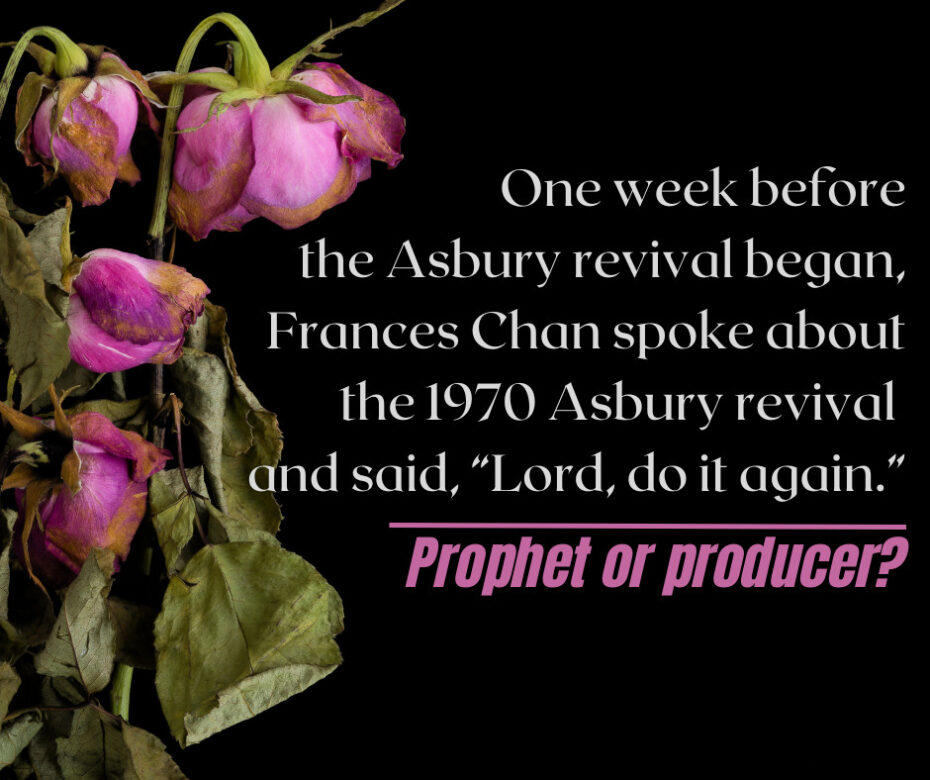Asbury University is a Wesleyan-Holiness school in Wilmore, Kentucky. The students stayed after the chapel service on Wednesday, February 8. Not for hours. But for days. They had worship services that lasted all day every day until Monday, February 20th, the last official on-campus service of the revival. It then moved off campus.
Wesleyan-Holiness teaches (see here) that everlasting life can be lost (see here), that perseverance until death is required to retain one’s salvation, and that perfection–or entire sanctification–is possible in this life.
They do not believe in justification by faith alone, apart from works.
That should be an enormous warning flag.
If there were reports of a BYU Revival, Evangelicals wouldn’t buy into it because they consider Mormonism as presenting a false gospel.
But not so with Asbury University.
Reports are that as many as 50,000 people have attended these meetings over two weeks.
Ken Yates did an excellent 8-minute video about the Asbury revival on the GES YouTube channel. See here.
For a detailed explanation of this event, see this detailed article by Rick Pidcock.
There was an earlier Asbury revival in 1970. This is not a random school having a random major event. There have supposedly been eight big revivals at this school since 1905.
In 2020, Asbury held a 50th-anniversary celebration of the 1970 revival.
On February 1, 2023–a week before this supposedly spontaneous revival began–Francis Chan, a hard-core Lordship Salvation preacher, spoke about the 1970 Asbury revival and then said there would be a special prayer meeting at Asbury University on February 23, 2023. He, Rick Warren, and other Evangelical leaders would be there. Coincidence? Hardly. The “revival” that began on February 8th was planned. See here for the Chan video that is less than two minutes long. It ends with “Lord, do it again.” Was Chan a prophet, or a producer?
The school newspaper, The Asbury Collegian, ran an article you can see here entitled, “Scheduled revivals are times of intentional focus.” Scheduled revivals?
IHOP, not the restaurant, but the charismatic church, International House of Prayer, has been involved in this revival.
The New Apostolic Reformation (NAR), a charismatic group so extreme that it says its leaders are modern-day apostles, is also involved. See this article by GotQuestions.org for a rundown on the NAR.
Charisma, the NAR magazine, is reporting on the revival.
People of nearly every denomination have attended. Even Catholics have been enthusiastic participants (see this article and this article).
While there is much enthusiasm about this revival, there is also much skepticism. It is not just Free Grace folks who are concerned. Many Evangelicals see this as an orchestrated event catering to emotions and experience. It is not based on Bible teaching.
This reminds me of Finney’s prescription for revival meetings. He compared revivals to planting, tending, and harvesting corn. He taught that if you had the right practices, you’d get 10% or more of those present at a meeting to come forward. His methods “worked” if you counted the number of those who walked the aisle. They did not work if you counted the number of people who believed in Jesus for everlasting life. (See this article, “Charles Finney’s Theology of Revival.”) The same can be said of this revival. Lots of people were moved. But how many were born again during these two weeks? I’ve not heard of any people professing to have come to faith. This is not an evangelistic revival.
Is it a sanctification revival? If so, how many who were already born again grew spiritually? Time will tell. The Bible says that lives are transformed by their minds being renewed via God’s Word (Rom 12:2; 2 Cor 3:18). How can two weeks without Bible teaching result in renewed minds and changed lives?
Anna Lowe, an Asbury student who writes for The Asbury Collegian, wrote an article about this revival entitled, “When the Dust Settles.” See here. It is based on her first-hand experience. Lowe wrote:
“But I have been to many a summer camp in my life, some fully present, others not as much. One concept constantly discussed before, during and after each camp is the idea of a “Jesus high”: an adrenaline rush from lack of sleep, excitement from newfound knowledge and the fulfilling promise of the Holy Spirit.
The most dangerous aspect of this Jesus high is that it wears off.
Once the dust settles, there is exhaustion from lack of adrenaline, agitation from disagreements and overall burnout from the lack of community encouragement. And eventually, I forget everything I learned until I am reminded again in this toxic and tiring cycle.
We must ensure that our community does not drift in a similar direction.
When the dust settles, and Hughes [Auditorium] is empty, what will remain?”
The term revival is not found in the Bible. The word revive occurs 27 times in the Bible, but never in the sense of mass spiritual renewal. It does occasionally refer to personal renewal of spiritual strength (e.g., Ps 119:25, 37, 40, 88, 107, 149, 154). Three times in Psalm 119 the Psalmist said, “Revive me according to Your word” (vv 25, 107, 154). The nation of Israel was moved back to the Lord when Ezra the scribe read before all the people from the Torah and “gave the sense, and helped them to understand the reading” (Neh 8:1-8).
The grass withers and the flower falls away, but the word of the Lord endures forever. Leave the Bible out of your meetings, and you get wilted flowers.


